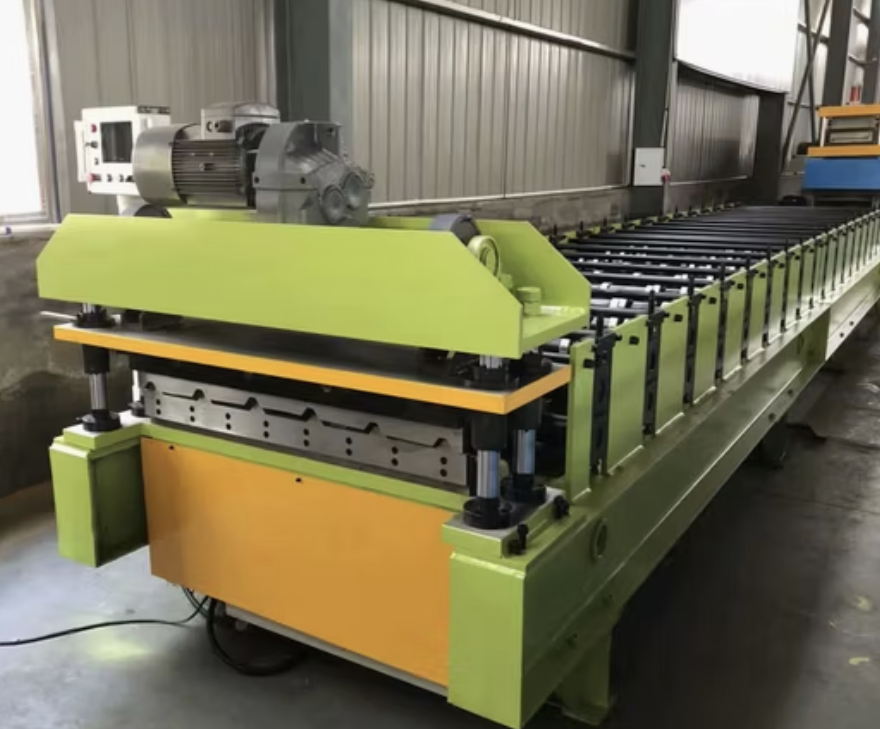Corrugated steel decking is a critical component in construction, providing strength, durability, and a cost-effective solution for flooring and roofing in various industrial and commercial projects. A Corrugated Steel Decking Roll Forming Machine is specially designed to manufacture these profiles efficiently and precisely. This guide covers everything you need to know about these machines, from specifications and profile details to pricing, setup, and maintenance.
Full Machine Description
The Corrugated Steel Decking Roll Forming Machine is an advanced system that transforms metal coils into corrugated decking profiles. Known for its speed, precision, and versatility, this machine is engineered to handle different gauges and sizes of steel, delivering consistent results with minimal waste. It is ideal for manufacturers who prioritize efficiency and scalability.
Machine Specifications
- Roller Materials
- Made from high-grade steel or chrome-coated materials to ensure durability and corrosion resistance.
- Designed for seamless shaping and long-lasting performance.
- Punching and Notching
- Integrated punching and notching systems for creating holes and slots in profiles.
- Hydraulic or servo-driven systems ensure precision and customization.
- Servo Motors
- High-performance servo motors provide accuracy in feeding and cutting operations.
- Energy-efficient and low-maintenance.
- Hydraulic Cutting Systems
- Hydraulic cutting systems ensure clean and accurate cuts at high speeds.
- Adjustable for various lengths and thicknesses.
- Frame Size
- Heavy-duty steel frames provide stability and minimize vibration during operation.
- Designed to handle large coils and high-speed operations.
- Motors and PLC System
- Motors: Multiple motors for uncoiling, feeding, and forming.
- PLC System: Fully programmable, user-friendly interface for automation and process control.
- Machine Speed
- Standard speed: 20–40 meters per minute, depending on profile complexity and material thickness.
- Safety Guards and Enclosures
- Fully enclosed system with interlocks and emergency stop features.
- Meets international safety standards for operator protection.
Profile Description
- Materials
- Galvanized steel, stainless steel, or pre-painted steel.
- Material thickness: Typically ranges from 0.8 mm to 2.0 mm.
- Sizes
- Widths and depths can be customized to meet specific project requirements.
- Material Gauge
- Suitable for lightweight and heavy-duty applications, depending on the project needs.
- Market Size for This Profile
- Widely used in construction, particularly for high-rise buildings, industrial sheds, and warehouses.
- Industries Using This Profile
- Construction (roofing and flooring), infrastructure projects, and prefabricated building industries.
- Countries Where This Machine Is Most Popular
- USA, India, China, and Gulf Countries: High demand due to robust construction industries and infrastructural development.
Optional Extras
- Stackers: Automatic stacking systems for efficient handling of finished profiles.
- Remote PLC Systems: Allow remote monitoring and control for enhanced convenience.
- Coil Car Tippers: Easy loading and unloading of coils.
- Uncoilers and Recoilers: Facilitate smooth feeding of metal coils into the machine.
- Automatic Stackers: Organize and stack profiles for streamlined operations.
- Leveling Systems: Ensure flat and even feeding of material into the machine.
- Coil Handling Systems: Enhance operational efficiency and reduce downtime.
Machine Pricing
- Low-End Pricing: $50,000–$70,000 (basic models with limited features).
- Mid-Range Pricing: $80,000–$120,000 (includes advanced automation and moderate customization).
- High-End Pricing: $150,000–$200,000+ (fully automated, high-speed models with extensive customization).
Setup and Installation
- Site Preparation
- Ensure adequate space, proper leveling, and sufficient power supply.
- Machine Assembly
- Follow manufacturer guidelines for assembling rollers, cutters, and control systems.
- Testing and Calibration
- Run test profiles to ensure accuracy and quality before full-scale production.
Maintenance Requirements
- Daily Maintenance
- Clean rollers and cutters to remove debris.
- Check for wear and tear on moving parts.
- Periodic Maintenance
- Lubricate bearings and moving components regularly.
- Inspect the PLC system and motors for performance issues.
- Annual Maintenance
- Comprehensive inspection of hydraulic and electrical systems.
- Replace worn-out components to ensure optimal functionality.
Questions and Answers
Q1: Can this machine produce multiple profile sizes?
Yes, most machines come with adjustable rollers and settings for different sizes.
Q2: How long does it take to set up the machine?
Typically, 2–3 days, depending on the model and site readiness.
Q3: Is training provided with the purchase?
Yes, manufacturers usually provide on-site or remote training for operators.
Q4: What is the warranty period for these machines?
Standard warranty is 1–2 years, covering major components.
Q5: Can the machine handle aluminum materials?
Yes, but adjustments are required for softer materials to avoid damage.




